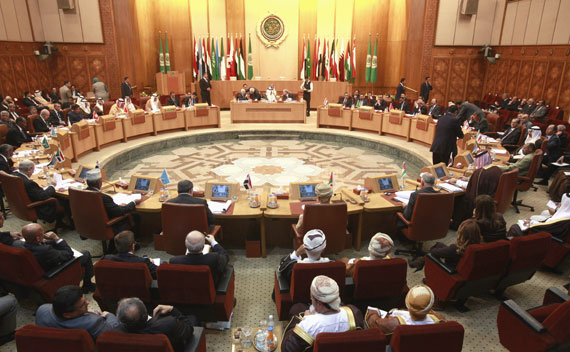Syria: When Is Enough, Enough?
More on:

On Saturday, the Arab League suspended Syria. No doubt this was a difficult decision for a body that, although it was the creation of the British Foreign Office has stood—at least rhetorically—for Arabism. Syria, the so-called “beating heart of Arab nationalism,” is not Libya. Still, the move and possibly economic and political sanctions are an important step in trying to either bring Assad to heel or end his regime altogether. I am profoundly skeptical of the former and, since almost the very beginning of the Syrian uprising, saw tremendous strategic benefit (to the United States) in the latter. The question is now that the Arab League has taken an important step in further isolating Damascus: What next?
Syria watchers, human rights activists, foreign policy realists, and others have been engaged in a rather detailed debate about what to do about Syria, but for all the ink spilled on the issue, there haven’t been any creative ideas. The advocates of the so-called “right to protect” principle, which gives the international community sanction to violate the sovereignty of another state if civilians are at great risk, have called Syria “tragic,” but have maintained that “Syria is different from Libya.” Indeed, it is. On the eve of Operation Unified Protector, about 1,000 people had died in the fighting between Libyan rebels and Qadhafi loyalists. As of last Friday, the United Nations reported that Bashar al Assad has killed two and a half times that many Syrians.
For their part, realists argue that we are over-stretched and that hastening the downfall of Assad—as odious as he may be—will likely destabilize the region. The result, they say, would be a further American commitment to the Middle East that Washington simply cannot afford, sapping U.S. power and making it harder for it to deal with important foreign policy issues like the rise of China and the financial crisis in Europe. Fair enough. China poses a new challenge to U.S. power in the Pacific and the economic woes of what is, collectively, the world’s largest economy is a strategic problem for the United States. Yet none of this has anything to do with Syria where, if nothing is done to prevent further slaughter there will be consequences for the stability of Turkey, Lebanon, and Iraq. It seems this is precisely what the Assad regime is aiming for through its renewed sponsorship of PKK attacks on Turkish forces and its ongoing skullduggery in Lebanon.
Apologists for the Assad regime claim that Syria is, indeed, the beating heart of Arab nationalism, which should give Westerners pause when contemplating a more forceful response to the Assad regime. They argue instead that Damascus is best swayed through negotiation. I am the first one to warn that the United States and Europe should be mindful of its history in the Middle East (see chapters 5-7 of The Struggle for Egypt), but should the international community use some hoary and romantic notions about Damascus being central to a vague set of ideas sometimes called “Arabism,” as an excuse for inaction? The Arab League no longer believes so. Do I even need to address the absurdity of continuing to advocate negotiations? The Turks, despite all the influence and goodwill Assad-Erdogan family vacations could buy, have been unable to convince Assad to stand down and undertake reforms. Most recently, Damascus promptly ignored all the commitments it made to the Qatari foreign minister, who was spearheading an Arab League initiative to resolve the Syrian crisis through talks with the Syrian opposition.
My point in going through all of this is to suggest that the excuses people have made to do nothing as Assad snuffs out the Syrian uprising 12, 15, 20, 25 people a day are actually the best reasons for taking a more forceful approach—even force (there, I said it)—to bring the immediate crisis to an end. It seems that the United States is moving ever more closely to this position. On November 7, Secretary of State Hillary Clinton gave a speech on the Arab uprisings at NDI. There was much to like about the speech, though some of it read more like an inside-the-Beltway blue ribbon commission than a major policy address. Still, whether intentional or not, it seems that Clinton’s words, specifically her vow that “America and the international community will continue to increase pressure on [Assad] and his brutal regime," could serve as the basis for a more robust Syria policy.
One can only hope. Assistant Secretary of State for Near East Affairs Jeffrey Feltman’s announcement before the Senate Foreign Relations Committee that the administration was pursuing additional sanctions on the regime and proposed to send international observers to Syria to “deter violence” was not exactly what I had in mind. Perhaps Feltman’s testimony was part of the Obama administration’s much ballyhooed penchant for playing “the long game,” but I am not sure too many Bosnian Muslims would tell Syrians to take comfort that international observers might be on the way. How many of them were massacred under the watchful eyes of Europeans sent there to deter Serbs from massacring Bosnians?
Here is the bottom line: When is enough, enough? Is it a coincidence that Assad and his clique have intensified the violence in recent days. They are not dumb. Although Clinton’s words may have given them pause, the official policy of sanctions and possibly observers is interpreted in Damascus as saying that Assad actually has little to fear from the United States and international community. It is time to prove him wrong.
More on:
 Online Store
Online Store
